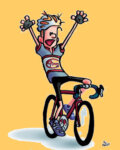Rules and scoring thread
Our Community › Forums › Freezing Saddles Winter Riding Competition › Rules and scoring thread
- This topic has 115 replies, 32 voices, and was last updated 7 years, 4 months ago by
chuxtr.
-
CreatorTopic
-
December 2, 2017 at 2:14 am #919889
 Steve OParticipant
Steve OParticipant@hozn 168983 wrote:
Maybe rule details need a new thread.
Here it is, and here’s hozn’s post that reflects my thinking as well:
@hozn 168895 wrote:I think one could pretty easily argue against a points system that simply rewards based on mileage (and some bonus for daily participation). This make it hard for folks who don’t have the luxury of being able to spend 4 hours a day on their bikes to ever hope to compete in the points competition. I think adding a social component to scoring could make it competitive to a much larger group and keep the competition more dynamic. I liked some ideas thrown out earlier (perhaps last year) about having bonus points based on winning some of the ongoing pointless prize competitions too, not sure how exactly that gets managed technically, but anything to keep the competition open seems like it would be an improvement.
-
CreatorTopic
-
AuthorReplies
-
December 2, 2017 at 1:39 pm #1079009
 LhasaCMParticipant
LhasaCMParticipant@Bob James 169087 wrote:
Diminishing returns appears to directly penalize for riding more. Riding a century in sub-freezing weather (add in wet conditions) is pretty miserable and often necessary for those living farther away for commutes and attending events. Adding bonus points is a direct reward and encourages daily riding and can accomplish similar “leveraging” results without giving the appearance of being punitive. Accelerating returns seems more positive and encouraging than diminishing returns.
Below is an example, of accelerating returns/points. At first it appears no difference in point spread, but if that century rider skips a day of riding and a daily rider does 10 miles, they would gain 65 points on the sporadic century rider. Again, with the theory that daily riding for most will also translate into more participation, such as convoys, social events, Strava titles, forum posts, etc…
[ATTACH=CONFIG]15807[/ATTACH]
I am fully on board with the idea that, mathematical equivalence or not, whatever we do should be most commonly perceived as encouraging something, not discouraging something else. (Hence why we couldn’t just take freeze points as it was constructed – there was no benefit to riding more than 9 miles.)
I agree that both constructs numerically have similar impacts – they offer a greater reward for greater frequency of riding so that the 100th mile isn’t worth as much as the 5th, but can be perceived very differently. One benefit of the earlier idea (not having tiers but having the diminishing returns for each incremental mile) is that it doesn’t set any sort of magic mile marker or judgement as “this number is what’s most valuable.” I think one of the other ideas behind a sliding scale of sorts to reduce point spreads in an attempt to keep the competition from being a foregone conclusion before the end – though theoretically diminishing returns also makes big swings harder to make (i.e., harder to make up a deficit) so it could all be a nothingburger.
How would you feel about a “1 point per mile plus a continuously diminishing bonus” construct? In other words, as mileage approaches “infinity” the bonus goes away rather than dropping out at 3 or 10 or whatever specific number is chosen, but it stays at the one point per mile throughout? For example, you have a 10 point bonus for miles 1, 2, and 3 as proposed elsewhere, but then the bonus is reduced by 10% for each incremental mile. That’d look like:
[ATTACH=CONFIG]15808[/ATTACH]
What would be great would be to take some more specific data and see what the three different approaches do to some other numbers over the course of a competition. I’ll work something up when I get a chance today for a few hypothetical riders (and what I actually did last year since I have the data).
December 2, 2017 at 1:40 pm #1079010 JuddParticipant
JuddParticipant@aaronwelsh 169088 wrote:
I think “losing points” and “being penalized” are not the right way to think about it. More miles will always equate to more points, just the rate of point accumulation will change as you ride.
Bob rode like 6,000 miles during Freezing Saddles last year while working full time. I’m pretty sure that there’s no way that a progressive point tax system won’t feel like a penalty.
December 2, 2017 at 1:45 pm #1079011 LhasaCMParticipant
LhasaCMParticipant@aaronwelsh 169088 wrote:
I think “losing points” and “being penalized” are not the right way to think about it. More miles will always equate to more points, just the rate of point accumulation will change as you ride.
True numerically – but since there many ways to get the same general effect, perception is important.
@DismalScientist 169089 wrote:
These formulas look like they are being written by tax-writing legislators. Just make points=miles**a, where a is .9 or something. Similarly, the 3 mile bonus scheme can be calculated as ARGMAX(10*miles,30). This limits the non-differentiability of the resulting point function. With this, I retire back into complete apathy regarding this issue.
Yep – those formulas are just like income tax brackets (rate a applies up to here, rate b applies to the next range, etc.) I think I realized this morning that I’m way too interested in the thought experiment just because I haven’t worked that part of my brain enough in quite a few years, which also means it’ll take me a while to work to the “here’s the simple version of the complicated thing I threw out there”.
And also – I’m not necessarily advocating for anything. I’m not going to win where something more than 3 miles counts regardless, so I’m just tossing things against the wall to see if anything sticks since there seemed to be some interest in a change.
December 2, 2017 at 2:06 pm #1079012aaronwelsh
Participant@LhasaCM 169093 wrote:
True numerically – but since there many ways to get the same general effect, perception is important.
Yep – those formulas are just like income tax brackets (rate a applies up to here, rate b applies to the next range, etc.) I think I realized this morning that I’m way too interested in the thought experiment just because I haven’t worked that part of my brain enough in quite a few years, which also means it’ll take me a while to work to the “here’s the simple version of the complicated thing I threw out there”.
And also – I’m not necessarily advocating for anything. I’m not going to win where something more than 3 miles counts regardless, so I’m just tossing things against the wall to see if anything sticks since there seemed to be some interest in a change.
Since we’re cyclists, perhaps it makes sense to think of it as a “breakaway headwind.” It makes it easier for small-miles participants to stay with the peloton. It makes it somewhat more difficult for the large-miles cyclists to go off the front.
It’s certainly a fair question whether that’s what we want. FS has always rewarded consistency with points. These schemes would increase the incentive for low-milage participants to up their miles (since they won’t simply get a first-mile bonus), with the downside of reducing the incentive for the high-milage cyclists to ride further. Since there are far more low-milage participants, and since FS is a community activity, I think this may be an improvement.
I suspect that the high-milage riders are more interested in who rides the furthest, rather than who earn the most points. To that end, we should probably let individuals compete on pure mileage, while teams will compete on points. (Maybe that’s already what we do?)
December 2, 2017 at 2:39 pm #1079014 Steve OParticipant
Steve OParticipant@aaronwelsh 169094 wrote:
I suspect that the high-milage riders are more interested in who rides the furthest, rather than who earn the most points. To that end, we should probably let individuals compete on pure mileage, while teams will compete on points. (Maybe that’s already what we do?)
You, or anyone, may offer a pointless prize for whoever rides the farthest. In the past, that has also been the person with the most points, but if we adjust the scoring system, that may no longer be the case.
December 2, 2017 at 2:47 pm #1079015 Steve OParticipant
Steve OParticipantThis is a great discussion, and I really like these ideas.
To keep the creative juices flowing, try a simple exercise that’s often used in various contexts to re-imagine an existing system:
Imagine you are creating a fun winter riding game that is intended to get people out on their bikes in weather they might otherwise not have ridden in, encourage people to create side games and fun activities, go on rides for beer or coffee or donuts, engage online (and in person) with their teammates, trash talk their opponents and all-in-all be part of a supportive and fun community of friends in a myriad of ways.
Create a scoring system for this game. Blank slate. Assume no technical constraints or pre-existing conditions.
December 2, 2017 at 5:18 pm #1079019 GreenbeltParticipant
GreenbeltParticipant@Steve O 169097 wrote:
This is a great discussion, and I really like these ideas.
To keep the creative juices flowing, try a simple exercise that’s often used in various contexts to re-imagine an existing system:
Imagine you are creating a fun winter riding game that is intended to get people out on their bikes in weather they might otherwise not have ridden in, encourage people to create side games and fun activities, go on rides for beer or coffee or donuts, engage online (and in person) with their teammates, trash talk their opponents and all-in-all be part of a supportive and fun community of friends in a myriad of ways.
Create a scoring system for this game. Blank slate. Assume no technical constraints or pre-existing conditions.
Bonus points for people over age 55, more than 200lbs, on group rides with other FS participants, and for everyday riding. There, I win.
December 2, 2017 at 5:40 pm #1079020 jrenautParticipant
jrenautParticipant@Steve O 169097 wrote:
Create a scoring system for this game. Blank slate. Assume no technical constraints or pre-existing conditions.
[Obligatory suggestion of exactly the scoring system we have now]
December 2, 2017 at 6:07 pm #1079021 LhasaCMParticipant
LhasaCMParticipant@jrenaut 169101 wrote:
[Obligatory suggestion of exactly the scoring system we have now]
[Just so we have it, obligatory suggestion of the same scoring system as the National Bike Challenge]
Sent from my ONEPLUS A5000 using Tapatalk
December 2, 2017 at 10:15 pm #1079025americancyclo
Participant@Steve O 169097 wrote:
Create a scoring system for this game.
No points for anyone. Go ride your bike with people you like. Have a drink. Win.
December 2, 2017 at 10:56 pm #1079026Bob James
Participant@LhasaCM 169102 wrote:
[Just so we have it, obligatory suggestion of the same scoring system as the National Bike Challenge]
Which is the same as FS currently, except for 20 points (instead of 10) for the 1st mile ridden each day.
December 2, 2017 at 11:02 pm #1079027 JuddParticipant
JuddParticipant@Greenbelt 169100 wrote:
Bonus points for people over age 55, more than 200lbs, on group rides with other FS participants, and for everyday riding. There, I win.
I don’t know how much Bob James weighs, but he might still be the winner under this rule set.
December 2, 2017 at 11:08 pm #1079029Bob James
Participant@Judd 169092 wrote:
Bob rode like 6,000 miles during Freezing Saddles last year while working full time. I’m pretty sure that there’s no way that a progressive point tax system won’t feel like a penalty.
Team 15 was the only one close to Team 10 last year. I probably rode about 2,000 miles more than I would have done normally, just to try and keep some competition for Team 10 so Judd wouldn’t get bored. Other’s on Team 15
also rode more because of the fun rivalry with Team 10. Of course, all our efforts were thwarted when Team 10’s powerhouse 6-8 riders would do a century together whenever they wanted to put Team 10 in its place. That being said, equitable team assignment can play a critical part in individual rider motivation. Though competition does not necessarily have to be for 1st place. The 15th place team can be competing with the 14th place team, etc.December 2, 2017 at 11:10 pm #1079030Bob James
Participant@Judd 169108 wrote:
I don’t know how much Bob James weighs, but he might still be the winner under this rule set.
I’m usually 195lbs, but I could keep myself over 200lbs with enough doughnut and pie rides during FS.
December 3, 2017 at 1:51 am #1079032 lordofthemarkParticipant
lordofthemarkParticipant@Greenbelt 169100 wrote:
Bonus points for people over age 55, more than 200lbs, on group rides with other FS participants, and for everyday riding. There, I win.
This perfectly illustrates my point. I want bonus points for being over 55, for being relatively new to winter riding, etc. We don’t have that of course. And that is FINE. I just mentally adjust for it. Not precisely of course, but generally. Not everything needs to be precisely measured in the main score (or even in side bets). The main score simply serves to set it up AS a competition, inviting trash talking, team building, etc. The rest is “emergent gameplay” that goes beyond the game design.
-
AuthorReplies
- You must be logged in to reply to this topic.